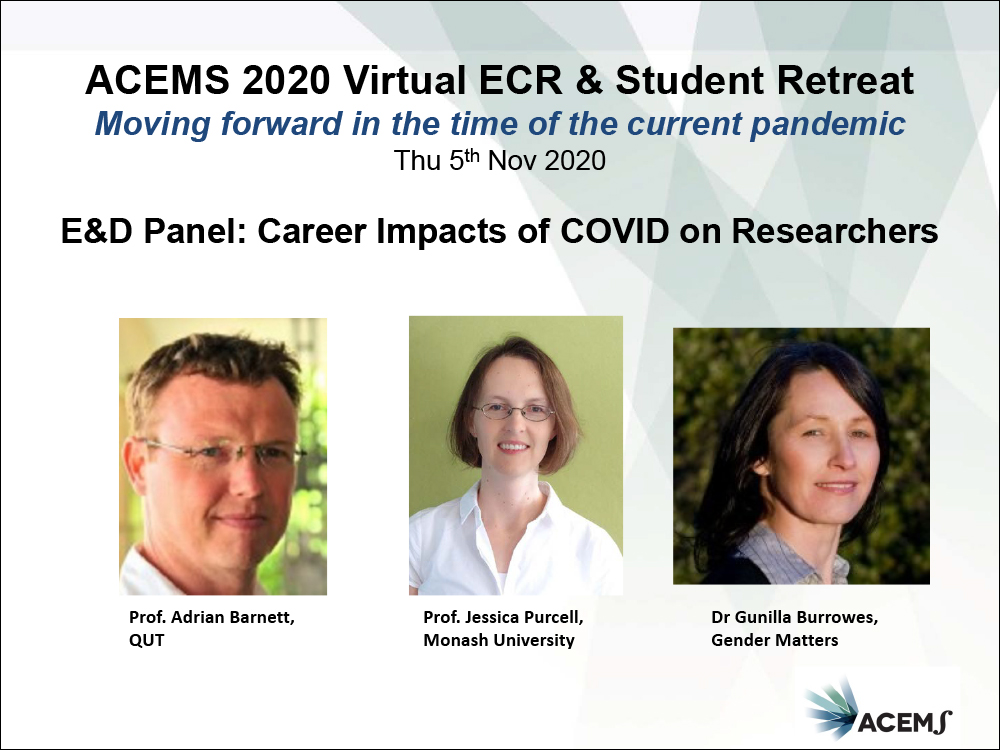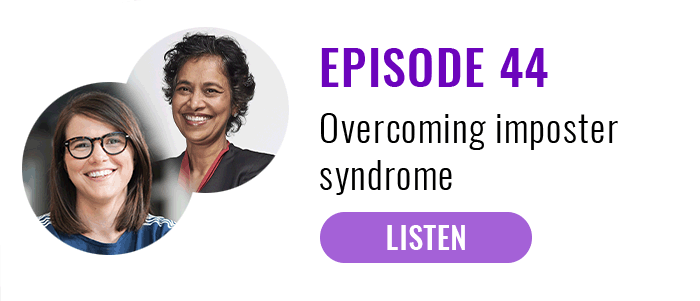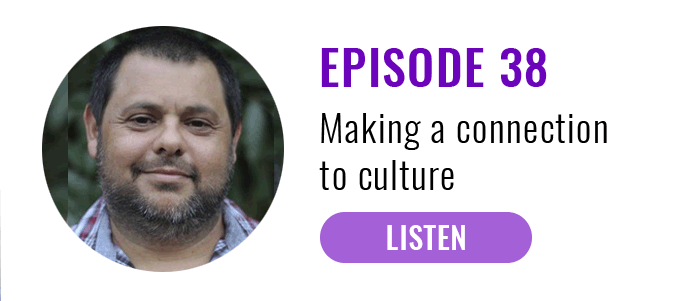
Equity and Diversity Program
ACEMS strongly believes that its membership, and the mathematical sciences in general, should reflect the diversity of the community.
One way that the Centre can contribute to this objective is by enabling an environment where everyone has an equal opportunity to achieve their goals. The Centre’s policies are aimed at achieving gender equality, but also to empowering all minority groups within ACEMS and encouraging respectful workplaces. Formed in 2018, the ACEMS Equity and Diversity Committee continued to develop and oversee initiatives in 2020.
Some of the many activities and initiatives that ACEMS has invested in to make a positive impact on its members and the broader community are highlighted below.
Click on the following sections to learn about:
Equity and Diversity Workshops
During 2020, ACEMS ran Equity and Diversity seminars and discussion panels on topics such as health and wellbeing, impacts of COVID-19 on researchers (particularly ECRs and women) and diversity and inclusion. The seminars were live streamed across all of the nodes including at the 2020 ACEMS Annual Retreat.
| Topic | Location | Details |
|---|---|---|
| ACEMS Health and Wellbeing Session | Live zoom session |
ACEMS Chief Investigators Louise Ryan (UTS), Kerrie Mengersen (QUT) and Ian Turner (QUT) ran a follow up discussion after the COVID survey (see below for more details on the survey) which was open to all members. They presented the survey results and Kerrie moderated some discussion with Louise and Ian on effective strategies for maintaining health and wellbeing, especially in stressful times. This was an informal discussion over lunch and there was plenty of time for questions. |
| Teaching Culture = Deep Learning. Teaching mathematics from an Aboriginal perspective | Virtual lecture |
Professor Chris Matthews is from the Quandamooka people of Minjerribah (Stradbroke Island) in Queensland Australia. Chris is the Chair of the Aboriginal and Torres Strait Islander Mathematics Alliance (ATSIMA) that aims to transform mathematics education for Aboriginal and Torres Strait Islander learners. He is also a senior curriculum advisor for Australian Curriculum, Assessment and Reporting Authority (ACARA) for the National Mathematics Curriculum working to including Aboriginal and Torres Strait Islander perspectives in the curriculum. In 2020, Chris was appointed the Associate Dean (Indigenous Leadership and Engagement) in the Science Faculty at University Technology of Sydney (UTS). Embedding Indigenous perspectives in the curriculum, particularly the mathematics curriculum, is often seen as political correctness to appease past wrongdoings. This usually goes hand-in-hand with the perception that Aboriginal and Torres Strait Islander peoples had no form of mathematics and hence, teaching from this perspective is pointless. This presentation explored the connection between mathematics and culture, how Terra Nullius has shaped our education system and how this maintains the status quo of poor educational outcomes for Aboriginal and Torres Strait Islander students. It also demonstrated how taking a cultural approach to the teaching and learning of mathematics leads to deep learning for all students. It then explored the connections between mathematics and Aboriginal culture, how this can be used to transform mathematics education for Aboriginal students and how this education is important for all students. |
| Panel discussion on the Career impacts of COVID-19 on researchers | Live zoom session at the ACEMS Annual Retreat |
ACEMS Research Fellow Rachael Quill chaired the session with panellists Associate Investigator Adrian Barnett (QUT and Statistical Society of Australia), Jessica Purcell (Monash University and WIMSIG Chair) and Gunilla Burrowes (Gender Matters). All three are authors of the Australian Academy of Science report ‘The impact of COVID-19 on women in the STEM workforce’. The discussion was aligned with the theme of the retreat. Moving forward in the time of the current pandemic. Topics discussed included working hours/reduced research time (due to caring responsibilities or online teaching), publication rates, career disruption, job insecurity, lost networking opportunities. Advice was provided to both ECRs and senior researchers on what could be done to try to mitigate these impacts in a post-COVID world including spending small, focused amounts of time each day on research or writing and petitioning against the reliance on numbers being the sole measure of research. ACEMS Members actively participated in the Q&A session that followed. |
| Q&A session on how ACEMS can support its members and the pathways out of COVID | Live zoom session at the ACEMS Annual Retreat |
Following the panel discussion at the retreat, ACEMS Director Peter Taylor led a Q&A session on how ACEMS can support its members and the pathways out of COVID. The discussion followed organically and covered topics including focusing on quality rather than quantity, financially supporting PhD students that are coming to the end of their candidature and may have been impacted by COVID, understanding the way that assessment panels work and what they consider in relation to gender and equity issues, looking at impact in areas in addition to research. |
Diversity and inclusion was strongly promoted this year and the session with E&D panel was really good
member feedback about the ACEMS Annual Retreat

Support during COVID-19 – ACEMS survey
A few months into the pandemic, ACEMS CI Louise Ryan and Research Fellow Khue-Dung ‘KD’ Dang conducted an informal survey of ACEMS members to see how they were doing in the face of COVID-19. Whilst not a scientific survey, it was an effort to check in on members and offer some support if needed. Over 50 members responded, many saying that they had felt affected by the pandemic in various ways. Many of the impacts aligned with those raised later in the year during the Equity and Diversity panel session at the ACEMS annual retreat and also to the responses received thorough the ACEMS Climate Survey. There were also many useful suggestions provided through the survey and Louise followed up with an e-mail to all members to acknowledging the impacts, share some of the suggestions and encourage members to reach out to each other for support if needed.
In late September, the European Women in Mathematics published an open letter which makes clear the unequal burden placed by the COVID-19 pandemic and its impact, both direct and indirect, on groups within mathematics. They highlight the extra demands and uncertainty faced by those in temporary employment, women, and caregivers. The letter also outlines proactive measures that institutions can take to mitigate the unfolding crisis for members of these groups. The Panel discussion held at the ACEMS Annual Retreat covered much of the content in the EWM letter and it is hoped that ACEMS is able to support this response, advocate for change and implement the recommended measures going forward.
Female-only Postdoctoral Positions
As seen in the Centre’s gender statistics for 2020, only 32% of all ACEMS academic staff and students are female (compared to 29% in 2019). The reasons for this imbalance are, of course, complex, and it will almost certainly take a range of measures to address the situation within ACEMS and within the wider mathematical sciences community.
To help address this imbalance, ACEMS created three female-only postdoctoral research fellow positions during 2019. Two of the successful applicants for these positions were to commence in 2020 (one had already commenced at UTS 2019). As at the end of 2020, the second of the positions had commenced at Monash (jointly funded by QUT), but COVID-19 prevented the third candidate coming to Australia and she eventually had to relinquish the position.
In its final year ACEMS is continuing its efforts to attract and support more female academic staff and students to the Centre, and the mathematical sciences.
International Women in Maths Day: events and resources
In 2020, ACEMS agreed to support proposals to celebrate International Women in Mathematics Day being coordinated through WIMSIG at universities across the country. Unfortunately, these activities were postponed due to COVID-19.
ACEMS led a national video campaign to celebrate International Women in Mathematics Day 2020 given face-to-face gatherings were not possible. Read more about it and view the videos here.
Supporting equity, diversity and inclusion via sponsorships
ACEMS has made a commitment to sponsor events that support equity and diversity, early-career researchers and increasing female representation rather than contributing to the general funding pool of an event. The Centre also aims to enable opportunities that would perhaps not be possible within the larger event without ACEMS’ support.
ACEMS asks all those submitting a sponsorship request about the gender equity strategies that have been put in place for the event, the gender split of speakers at the event, whether they have considered providing support for families (such as child care or funding for attendees/speakers to bring dependants), and whether they considered other cultural and diversity matters (such as providing space for prayer, or breaks at these times, dietary requirements, and access and mobility requirements). Moreover, the Centre requires all events which it sponsors to have a Code of Conduct and process for the handling of complaints.
Whilst the demand for sponsorship declined in 2020 due to the virtual nature of many activities, ACEMS still sponsored a number of events that made a great impact on the mathematical sciences community. Read summaries of some of these events here.
Mentoring
The Centre’s Mentoring Program has several elements, including one-on-one mentoring relationships where members are matched based on the mentee’s needs and the mentor’s expertise and background. Several mentees have requested a mentor that could help them to navigate a successful research career by discussing considerations that might fall under the banner of equity and diversity, such as building confidence and overcoming feelings of inadequacy; managing work-life balance, particularly when family is a priority; and making the most of a non-standard career path. As always, ACEMS will continue to encourage and support members to find appropriate mentors to help them thrive in their studies and career.
Podcast
2020 saw the launch of the third and fourth seasons of the ACEMS podcast “The Random Sample” featuring ACEMS women both as hosts (Research Fellow Jacinta Holloway-Brown, Chief Investigator Louise Ryan, Chief Operating Officer Anita Vecchies and three-time host Associate Investigator Sevvandi Kandanaarachchi) and guests (Associate Investigators Susanna Cramb and Julie Vercelloni).
As with previous seasons, a number of shows discussed topics with an equity, diversity and inclusion angle, including “Overcoming Imposter Syndrome” – an episode where ACEMS Associate Investigator Sevvandi Kandanaarachchi talked to Professor Asha Rao (Associate Dean of Mathematics at RMIT, Interim Director of AMSI and Superstar of STEM) and Dr Sophie Calabretto (Senior Lecturer, Macquarie University, 2-time Eureka Award Finalist for 'promoting the understanding of science' and 2017 Radio National 'Top 5 Under 40' Scientist) about why the numbers are so low for women in maths, the role women are being asked to play in making that change, and why many women are battling imposter syndrome; and “Making a Connection to Culture” – an episode where ACEMS CI Louise Ryan talked to Professor Chris Matthews (chair of the Aboriginal and Torres Strait Islander Mathematics Alliance) about the strong connections between mathematics and Aboriginal culture and that these connections need to be used to transform how Aboriginal students learn maths. Even more, Chris believes these connections, and this education, can create a ‘pattern’ for success for all teachers and students when it comes to teaching and learning maths.
Other events and activities
ACEMS members organised and took part in a range of other events and activities, and while doing so, supported greater diversity and inclusion in the mathematical sciences. Some of these events and activities are described above, but many actions were done more subtly, such as by advocating for speaker and participant diversity when planning events; nominating a broader range of speakers for seminars, workshops, colloquia and public lectures; nominating a broader range of people for awards; and recognising and celebrating individual successes that might otherwise be overlooked.
Carer’s Provision Fund
The ACEMS Carer’s Provision Fund, introduced in 2018 to formally provide additional funding for those with caring responsibilities, was again offered to its members in 2020. ACEMS invites its members who have primary carer responsibilities, or require additional care in order to travel, to apply for funding support to cover additional costs. The Carer’s Provision Fund can be used to support attendance at a conference or meeting, a visit to an ACEMS collaborating organisation, or to undertake research training. At all ACEMS-organised conferences, invited speakers are also eligible to apply for support through the Carer’s Provision Fund.
In the 2019 Climate Survey, one of the questions that received the lowest level of agreement was “The Centre provides sufficient support for parents and carers”. In response, the Carer’s Provision Fund was actively promoted in 2020, including in ACEMS newsletters when advertising conferences and in communications and the registration form for the Centre’s annual retreats.
The Centre however, did not receive any applications for the Carer’s Provision Fund in 2020, perhaps since most events in 2020 were virtual. It is hoped that this is an indication that the virtual format of these events meant that members that had primary carer responsibilities could attend without the requirement of additional support.
ACEMS will continue to provide and promote the fund in 2021 and, with plans underway for the final celebration retreat to be held in person, the attendance of all members will be supported (and their families as needed) at the event. See the Climate Survey section below for plans on reviewing the Carers Support Fund in 2021.
Code of Conduct and Complaints Process
ACEMS has a comprehensive Code of Conduct and a complaints process. These aim to outline and define the Centre’s expectations of members by ensuring that all members are aware of the principles of equality, fairness, inclusion and respect, that ACEMS holds as paramount.
For both the 2020 Student and ECR Retreat and the Annual Retreat, links to the Code of Conduct were provided in communications beforehand. A brief summary and link to the full Code of Conduct – along with photos and contact details of the retreat Code of Conduct Allies – was also included with the Retreat schedule on the ACEMS webpage. Click here to see the ‘Retreat Week’ summary.
Climate Survey
Finally, in late 2020 the Centre conducted its third annual climate survey to better understand the Centre’s many strengths, where there is room for improvement, and seek new ideas for the year ahead. ACEMS again outsourced this climate survey, with Leaderskill running a comprehensive ’repeat’ survey which was kept very similar to the 2019 Survey. This allowed a comparison of results between the two years. Additional questions were included to assess member experiences influenced by changes in work due to COVID-19.
While there are still some things to address, it is fair to say that the survey indicates that ACEMS has done well to develop a positive working environment for its members.
The overall experience of ACEMS members is very positive: 94.5% rated this as ‘Good’ or ‘Excellent’ (up from 85% in 2019-20). In fact, 96% of members rated their experience as either Excellent (58.2%), Good (36.4%) or Average (1.8%). This is a strong statement of the level of engagement of members – even where areas have been highlighted for improvement, members enjoy being part of the Centre.
The highest levels of agreement across the survey are in relation to respect, work-life balance, vision and leadership, inclusiveness, positive working environment, and open communication and flexibility, with more than 90% of members responding to each of the following questions with ‘Agree’ or ‘Strongly Agree’:
- Others treat me with respect at work
- The Centre offers flexible working arrangements that meet my needs to balance work, personal life and family commitments
- Open and honest communication is encouraged by ACEMS leadership
- ACEMS leadership communicates a shared vision, purpose and direction for the Centre
- I am aware of the Centre's values, Code of Conduct and expectations of its members
- The Centre fosters an environment where people of diverse backgrounds and lifestyles can work together effectively
- The Centre is doing a good job to promote equity and diversity
- ACEMS leadership is working to build a collegial and collaborative Centre
Like 2019, the vast majority of members expressed the belief that ACEMS is an inclusive and respectful working environment that is flexible and friendly and where people of all nationalities, cultures and religions are recognised for their contributions. Average scores have increased since the 2019-20 survey.
Not surprisingly, over 50% of respondents indicated that COVID negatively affected their productivity, collaboration and networking at ACEMS. Over 45% of respondents also indicated that their motivation was negatively impacted by COVID. It is positive to note however, that when needed, 78.72% of respondents indicated that the Centre provided them with support during COVID.
In terms of room for improvement, the main topics that received the lowest levels of agreement across the survey related to reading the ACEMS newsletter, visiting other institutions, usefulness of the ACEMS Member Portal, and support for parents and carers.
In 2021, the Equity and Diversity Committee and Executive Committee will spend time going through the detailed results of the full survey to establish a set of recommendations that ACEMS will endeavour to implement over the final year of the Centre. This includes suggestions from respondents on how the Centre can provide support for research to return to ‘normal’ following COVID. One of the first activities that will be prioritised is to review the ACEMS Carers Support Fund to identify ways in which it can be adapted to include support for carers in a virtual world and also ways that the fund can be promoted more broadly.

